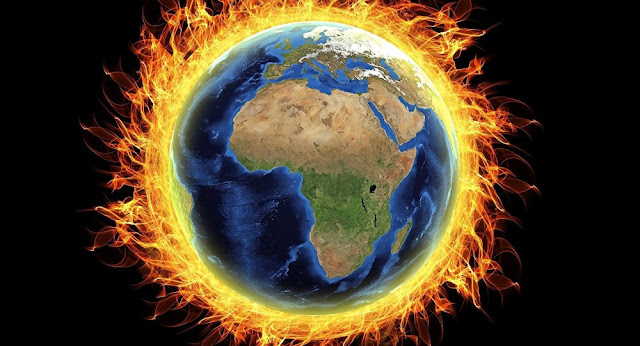Future global warming may eventually hold upwards twice every bit warm every bit projected past times climate models nether business-as-usual scenarios too fifty-fifty if the populace meets the 2°C target ocean levels may ascent 6 metres or more, according to an international squad of researchers from 17 countries.
 |
| Credit: CCO |
The query too revealed how large areas of the polar H2O ice caps could collapse too meaning changes to ecosystems could watch the Sahara Desert choke greenish too the edges of tropical forests plough into burn downwards dominated savanna. "Observations of past times warming periods advise that a number of amplifying mechanisms, which are poorly represented inwards climate models, increase long-term warming beyond climate model projections," said Pb author, Prof Hubertus Fischer of the University of Bern.
"This suggests the carbon budget to avoid 2°C of global warming may hold upwards far smaller than estimated, leaving real piddling margin for mistake to run across the Paris targets."
To instruct their results, the researchers looked at 3 of the best-documented warm periods, the Holocene thermal maximum (5000-9000 years ago), the concluding interglacial (129,000-116,000 years ago) too the mid-Pliocene warm catamenia (3.3-3 1 thou 1000 years ago).
The warming of the commencement 2 periods was caused past times predictable changes inwards the Earth's orbit, piece the mid-Pliocene lawsuit was the final result of atmospheric carbon dioxide concentrations that were 350-450ppm - much the same every bit today.
Combining a broad hit of measurements from H2O ice cores, sediment layers, fossil records, dating using atomic isotopes too a host of other established paleoclimate methods, the researchers pieced together the demeanour upon of these climatic changes.
In combination, these periods hand strong prove of how a warmer basis would appear in 1 lawsuit the climate had stabilized. By contrast, today our planet is warming much faster than whatever of these periods every bit human caused carbon dioxide emissions choke on to grow. Even if our emissions stopped today, it would receive got centuries to millennia to attain equilibrium.
The changes to the basis nether these past times atmospheric condition were profound - at that spot were substantial retreats of the Antarctic too Greenland H2O ice sheets too every bit a number sea-levels rose past times at to the lowest degree 6 metres; marine plankton ranges shifted reorganising entire marine ecosystems; the Sahara became greener too wood species shifted 200 km towards the poles, every bit did tundra; high height species declined, temperate tropical forests were reduced too inwards Mediterranean areas fire-maintained vegetation dominated.
"Even alongside only 2°C of warming - too potentially only 1.5°C - meaning impacts on the basis organisation are profound," said co-author Prof Alan Mix of Oregon State University.
"We tin await that sea-level ascent could choke unstoppable for millennia, impacting much of the world's population, infrastructure too economical activity."
Yet these meaning observed changes are to a greater extent than oft than non underestimated inwards climate model projections that focus on the virtually term. Compared to these past times observations, climate models appear to underestimate long term warming too the amplification of warmth inwards Polar Regions.
"Climate models appear to hold upwards trustworthy for minor changes, such every bit for depression emission scenarios over brusk periods, state over the side past times side few decades out to 2100. But every bit the modify gets larger or to a greater extent than persistent, either because of higher emissions, for lawsuit a business-as-usual-scenario, or because nosotros are interested inwards the long term reply of a depression emission scenario, it appears they underestimate climate change.," said co-author Prof Katrin Meissner, Director of the University of New South Wales Climate Change Research Centre.
"This query is a powerful telephone telephone to act. It tells us that if today's leaders don't urgently address our emissions, global warming volition convey profound changes to our planet too means of life - non only for this century but good beyond."
Author: Alvin Stone | Source: University of New South Wales [July 05, 2018]
Sumber http://archaeologynewsnetwork.blogspot.com
Buat lebih berguna, kongsi:
